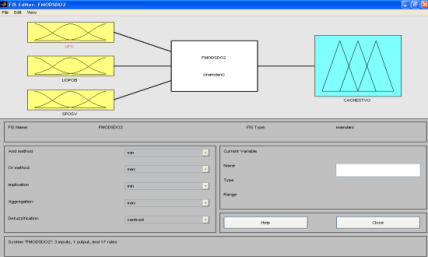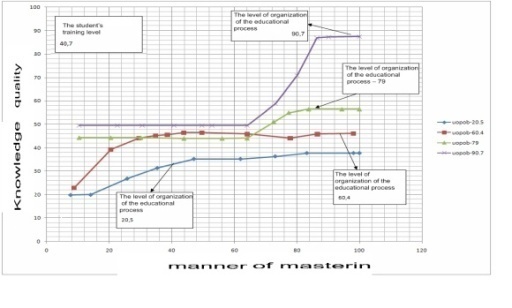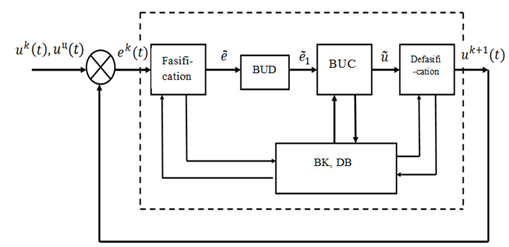-
Paper Information
- Next Paper
- Paper Submission
-
Journal Information
- About This Journal
- Editorial Board
- Current Issue
- Archive
- Author Guidelines
- Contact Us
Applied Mathematics
p-ISSN: 2163-1409 e-ISSN: 2163-1425
2012; 2(3): 51-54
doi: 10.5923/j.am.20120203.01
Working out The Principles of Adaptive Management to Educational Processes in The E-Learning
R.N. Usmonov, V.S. Khamidov
Computer Systems, Tashkent University Of Information Technology, Tashkent, 100000, Uzbekistan
Correspondence to: V.S. Khamidov, Computer Systems, Tashkent University Of Information Technology, Tashkent, 100000, Uzbekistan.
| Email: |  |
Copyright © 2012 Scientific & Academic Publishing. All Rights Reserved.
Suggesting the technology of intellectualization the process of adaptive management, based on situational analysis of educational process in the networking of single supporting system of decision making in E-learning.
Keywords: Adaptive Management, Knowledge Base, Database, Term-Sets, Fasification, Defasification
1. Introduction
- Strategy of decision making (DM) in the system of E-learning (EL) is defined by individual behavior of a trainee in the process of studying the appointed subject. At this integration the didactic potential of contemporary informational technology (CIT) in EL considered to be one of the leading aspects raising the efficiency of teaching process. Characteristics of educational process (EP) at this are the sequence producing extent of teaching materials, TM the content, quantity and types of control-checking works (CChW), species and the methods of learning or adoption the TM. Working out and supporting of ordinary computerized education is defined by strategies creating the adequate level of knowledge of the trainee, educational Trass navigations that is not ought to be combined with informational combination of ordinary educational teaching materials. Hereof the barest necessity of optimization the process of training in EL which traditionally turn out to minimizing the time of training under the fixed level of learning or to the maximizing the content of learning under preserved time of teaching. On this correlation below queries of intellectualizing processes of assistance accepted decision in EL on the foundation of integrating principles, theories of odd aggregate (TOA) are being considered. In informational relations the educational process in educational institutes is characterized by domination of subjective information’s verbal character, which on the whole explained by relationship of pedagogic system to humanistic categories. Considerable part of information, concerning pedagogic systems, introduced in kind of verbal estimation of the majorities’ data educational process, for example, such as the attendance by students the classes, their progress in studies, the degree of learning by them the themes theoretic or practical hours and etc. The problem of receiving complex, objective assessment the quality of organization’s educational process, requires utilization, in the process of making decision of all accessible information, including the quantitative information, (rating point of the students, the quality of missed hours and etc), and also quantitative (experience, the competence of the tutor, relation among different compound pedagogic system, introduced in the kind of linguistic points) characters. Directly and not indirectly, utilization in the process of modeling pedagogic processes the information of fuzzy character, presented in the form of verbal assessment the parameters of pedagogic system, considered to be an important moment in the achievement of modeling the basic goals - use of visual methods, certainty, objectivity.
2. Main body
- On the one hand, formalization of pedagogic processes and phenomenon on the base principles of TOA enables to scrutinize methodologies, on the other hand – as a subject to solve specific pedagogic tasks, resolving on this gnosiological tasks, generally procedural and psychologically character. Gnosiological aspect of modeling methodology suppose applies in the process of cognition the pedagogic phenomenon; generally procedural aspect – estimate fuzzy connections and relations between component and date of pedagogic process, yet physiological aspect – describes variety side pieces of educational and pedagogic activity for the purpose of definition – psycho-pedagogical regularities. Intellectual modeling activity of a trainee on the base of managing decision with the sequence of their realization in the real time is the basic proposing scheme of adaptive management. According to current layout, on the entry of systems given the information concerning the preparedness level of a trainee, organizational process training in EL, about the methods of a teaching and knowledge quality of a trainee. Trainees’ preparation level (initial, current) is identified through the degree of learning by themselves TM. By this way, estimating the current advancement of a trainee while crossing from any to k+1 learning TM cycle is a quite significant. The level organization process of teaching in E-learning depends on amenities of interface, introduced E-learning, the systems of organization and supervision of trainees’ knowledge and etc. Readiness methods of assimilation TM depends on quality and quantity of proposing tests, teaching-methodological materials and classified as superficial, deep, absorbed. The knowledge quality of a trainee – entire aggregate the steady attribute of knowledge, characterized by results cognitive activity of trainee, including current aspects:Systematicness of knowledge, defined as integrating quality, being the result of conscious interaction, completeness, depth, certainty and generalization. Efficacy of knowledge, visualizing in the ability of a trainee to use own knowledge in the solution of teaching and practical tasks, on top of that the tasks of vital character. Solidity of knowledge, mastering on reflectivity and appearing in shaping the skills of self-analysis, self-assessment with consideration of others evaluation.
 Targeting condition the object’s management: t- time;
Targeting condition the object’s management: t- time;  Preparedness level of a trainee>
Preparedness level of a trainee>  The level organization process teaching in E-learning>
The level organization process teaching in E-learning> Mastering methods of teaching materials>
Mastering methods of teaching materials> The quality of teaching>
The quality of teaching> - targeting means of appropriate function, k-cycle teaching K-0,1,2…;
- targeting means of appropriate function, k-cycle teaching K-0,1,2…; -declining condition of MC from targeting which in what follows defasifacate. If
-declining condition of MC from targeting which in what follows defasifacate. If  accept as an fuzzy means
accept as an fuzzy means  then
then  characterizes term;
characterizes term; , where
, where ,
,  ,
,  ,
,  ,
, . Herewith, VBR-vastly below rates; BR-below rates; R-rate;AR-above rates;VAR-vastly above rates.These linguistical estimations of educational quality are defined by means of checking action, questioning on the base of conventional rates of evaluation which is accepted in the higher education system. The base of given managerial system is a block of the ill-defined – logical conclusion which is oriented on realization of the following ill-defined model:
. Herewith, VBR-vastly below rates; BR-below rates; R-rate;AR-above rates;VAR-vastly above rates.These linguistical estimations of educational quality are defined by means of checking action, questioning on the base of conventional rates of evaluation which is accepted in the higher education system. The base of given managerial system is a block of the ill-defined – logical conclusion which is oriented on realization of the following ill-defined model: | (1) |
 parameters which is define the educational process, taken as linguistical changes (LC):
parameters which is define the educational process, taken as linguistical changes (LC): - < the level of a student’s knowledge>;
- < the level of a student’s knowledge>; - < the level of organization of the educational process ELS>;
- < the level of organization of the educational process ELS>;  - < the ways of the mastering of EM available in ELS>;
- < the ways of the mastering of EM available in ELS>;  -< the evaluation of student’s knowledge quality>.The Attributes ЛП
-< the evaluation of student’s knowledge quality>.The Attributes ЛП introduced by means of term-sets corresponding to universal sets.Herewith,
introduced by means of term-sets corresponding to universal sets.Herewith, | (2) |
 (the bell-shaped, triangular, trapezoidal etc.) The knowledgebase presents itself system of the ill-defined rules, realizing ill-defined model of the type (1). Briefly we stop on linguistical estimations (the semantics) of terms LC
(the bell-shaped, triangular, trapezoidal etc.) The knowledgebase presents itself system of the ill-defined rules, realizing ill-defined model of the type (1). Briefly we stop on linguistical estimations (the semantics) of terms LC  [6,8,9]:
[6,8,9]: -
-  -
-  - < The student has enough high level of training, he tries to get the maximum of the knowledge required for practicing>;
- < The student has enough high level of training, he tries to get the maximum of the knowledge required for practicing>; -
-  - < In selecting EM of the educational process is taken into account the student’s training level, but feedback is organized weakly >;
- < In selecting EM of the educational process is taken into account the student’s training level, but feedback is organized weakly >; - < The educational process in ELS is organized by taking into account student’s training level, the feedback is organized on high methodical level with provision for possible limits >;
- < The educational process in ELS is organized by taking into account student’s training level, the feedback is organized on high methodical level with provision for possible limits >; - -
- -  -
-  - < The educational method is chosen by taking into account the student’s estimation progresses during the training subject’s sections>;
- < The educational method is chosen by taking into account the student’s estimation progresses during the training subject’s sections>; - < The student’s knowledge does not match to the purposes of the education>;
- < The student’s knowledge does not match to the purposes of the education>; -
-  - < The student has enough strong knowledge he is able to use it for solving the concrete tasks >.The realization of the ill-defined-logical model of the complex evaluation of the student’s knowledge quality (1) is realized on the base of the designing the rule-oriented rules - a set of the controlling rules of the ill-defined logic, which is connecting inputs of the system with its output. Herewith is used taken above LC, and it’s forming - the terms, as well as their ill-defined values. On the base incorporated by LC and its terms, the ill-defined model of the student’s evaluation quality in ELS can be illustrated below:
- < The student has enough strong knowledge he is able to use it for solving the concrete tasks >.The realization of the ill-defined-logical model of the complex evaluation of the student’s knowledge quality (1) is realized on the base of the designing the rule-oriented rules - a set of the controlling rules of the ill-defined logic, which is connecting inputs of the system with its output. Herewith is used taken above LC, and it’s forming - the terms, as well as their ill-defined values. On the base incorporated by LC and its terms, the ill-defined model of the student’s evaluation quality in ELS can be illustrated below: The numeric evaluation of the student’s knowledge quality (y*) for concrete values (numeric, linguistical) parameters in quantitative attitude is defined by the method of dephasification by the principle of the center of gravity [1,3-5].The block of the diagnostics in educational process of adaptive management system is based on the determination of the taken decisions strategy on the base of the ill-defined analysis to situations, according to which whole information, incoming to input of the system (
The numeric evaluation of the student’s knowledge quality (y*) for concrete values (numeric, linguistical) parameters in quantitative attitude is defined by the method of dephasification by the principle of the center of gravity [1,3-5].The block of the diagnostics in educational process of adaptive management system is based on the determination of the taken decisions strategy on the base of the ill-defined analysis to situations, according to which whole information, incoming to input of the system ( ) phasificates and is defined by an ensemble of standard situations, under which is understood the ensemble of the most typical situations, as well as the ensemble of purpose-oriented situations. The incoming to input of the block of the diagnostics phasificated information introduces in the manner of ill-defined current situation that is matched with purpose-oriented situation. As a result defined condition of the object of management, taken the controlling decisions, which are realized on the block of ill-defined-inference. MDS process begins with AF determinations parameter situations:where:
) phasificates and is defined by an ensemble of standard situations, under which is understood the ensemble of the most typical situations, as well as the ensemble of purpose-oriented situations. The incoming to input of the block of the diagnostics phasificated information introduces in the manner of ill-defined current situation that is matched with purpose-oriented situation. As a result defined condition of the object of management, taken the controlling decisions, which are realized on the block of ill-defined-inference. MDS process begins with AF determinations parameter situations:where:  | (5) |
 | (6) |
 indicators of object of the studies define under
indicators of object of the studies define under  meaning. Herewith designs of the type are used:where
meaning. Herewith designs of the type are used:where
 ,
,  - lower and upper values of ill-defined numbers;
- lower and upper values of ill-defined numbers;  on zero α -level;
on zero α -level;  - average values of these numbers on single α -level.Adaptive management is realized on the base of the following ill-defined operators [1,8]:
- average values of these numbers on single α -level.Adaptive management is realized on the base of the following ill-defined operators [1,8]: where G, L, Z - LC, herewith , G-
where G, L, Z - LC, herewith , G-  Forming terms – sets of LC G, L are
Forming terms – sets of LC G, L are  ; R23:
; R23:  ,
, .Herewith each operator Rij is put in correspondence to matrix, describing power of the influence of controlling decisions in term of values sign
.Herewith each operator Rij is put in correspondence to matrix, describing power of the influence of controlling decisions in term of values sign ,
, .In particular for the term
.In particular for the term  -
-  have:
have: ,
, .We shall use hereto condition operator R12 by means of
.We shall use hereto condition operator R12 by means of  matrix then shall get:
matrix then shall get:
 i.e. as a result of realization controlling operator, the student’s knowledge level increased from category 0.9/ H to
i.e. as a result of realization controlling operator, the student’s knowledge level increased from category 0.9/ H to  categories. The efficient facility to realization of the complex approach in organizations, planning and management EP in ELS is a complex of programmes Fuzzy Logic Toolbox (FLT) functioning in ambience MatLab[3,5].Modeling OP is in system FLT reasonable to divide into the following interconnected stages [3,4,5]:Determination input and output parameter to models;Designing the database and knowledge for the development of the ill-defined model of the type Mamdani;Undertaking computing experiment (CE) on the base of ill-defined built model;Making the pedagogical decisions and recommendation on the base of the processing result CE.As a matter of convenience all input and output variable (x1, h2, h3, y) are characterized alike terms-sets T = {low, average, high}, on unique universal sets marks [0,100].The Ill-defined model of the evaluation of the student’s knowledge quality is illustrated below:
categories. The efficient facility to realization of the complex approach in organizations, planning and management EP in ELS is a complex of programmes Fuzzy Logic Toolbox (FLT) functioning in ambience MatLab[3,5].Modeling OP is in system FLT reasonable to divide into the following interconnected stages [3,4,5]:Determination input and output parameter to models;Designing the database and knowledge for the development of the ill-defined model of the type Mamdani;Undertaking computing experiment (CE) on the base of ill-defined built model;Making the pedagogical decisions and recommendation on the base of the processing result CE.As a matter of convenience all input and output variable (x1, h2, h3, y) are characterized alike terms-sets T = {low, average, high}, on unique universal sets marks [0,100].The Ill-defined model of the evaluation of the student’s knowledge quality is illustrated below: | (8) |
 | Figure 2. Structure to ill-defined model, the evaluation of the quality of OП in FLT |
 | Figure 3. The results of CE on the base of interactivity model of ОП in FLT |
3. Conclusions
- Since one of defining elements of the ELS efficiency is an adequate determination of the student’s knowledge level under k-ohm cycle of the education, that follows specifically to note the questions, connected with evaluation of the knowledge quality, including complex evaluation of such sides, as fullness, depth, operation indicator, flexibility, contrast, convolution indicator, systematic indicator, system regulation and realization of getting knowledge [8].In conclusion we shall note that efficiency of the computer training systems is defined by designing methodical aspects evaluations of the student’s knowledge level degree of learning subject, well-timed diagnostics discovery, the warning of backlog elements, as well as adaptive decision on a matter their removal.
 Abstract
Abstract Reference
Reference Full-Text PDF
Full-Text PDF Full-Text HTML
Full-Text HTML